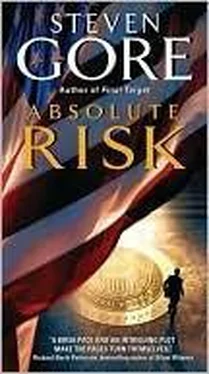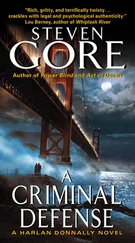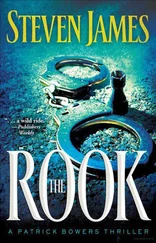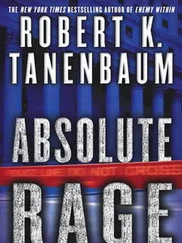Steven Gore - Absolute Risk
Здесь есть возможность читать онлайн «Steven Gore - Absolute Risk» весь текст электронной книги совершенно бесплатно (целиком полную версию без сокращений). В некоторых случаях можно слушать аудио, скачать через торрент в формате fb2 и присутствует краткое содержание. Жанр: Триллер, на английском языке. Описание произведения, (предисловие) а так же отзывы посетителей доступны на портале библиотеки ЛибКат.
- Название:Absolute Risk
- Автор:
- Жанр:
- Год:неизвестен
- ISBN:нет данных
- Рейтинг книги:5 / 5. Голосов: 1
-
Избранное:Добавить в избранное
- Отзывы:
-
Ваша оценка:
- 100
- 1
- 2
- 3
- 4
- 5
Absolute Risk: краткое содержание, описание и аннотация
Предлагаем к чтению аннотацию, описание, краткое содержание или предисловие (зависит от того, что написал сам автор книги «Absolute Risk»). Если вы не нашли необходимую информацию о книге — напишите в комментариях, мы постараемся отыскать её.
Absolute Risk — читать онлайн бесплатно полную книгу (весь текст) целиком
Ниже представлен текст книги, разбитый по страницам. Система сохранения места последней прочитанной страницы, позволяет с удобством читать онлайн бесплатно книгу «Absolute Risk», без необходимости каждый раз заново искать на чём Вы остановились. Поставьте закладку, и сможете в любой момент перейти на страницу, на которой закончили чтение.
Интервал:
Закладка:
Abrams smiled to himself as he recalled the last of the three-part Economist series that had reported that Levinson was now back to teaching Econ 101 at Michigan State, that his private jet was now owned by the CEO of Relative Growth Funds, and that the woman he’d divorced his wife to marry, and who’d once found his bald spot so endearing, had now decided that she only wanted to be friends.
“More fundamentally,” Abrams continued, “the theories by which we have managed both the economy and our investment practices are driven not by science, but by…”
Ivan Kahn, the mule-teethed 1970s radical, now the economy writer for The Nation, made a fist as if his favorite football team, six points behind with thirty seconds to play, had just made a first down at the one-yard line. Abrams imagined him finishing the sentence in his mind with the word “greed” or “corruption” or “selfishness,” the assumed sins of the wealthy.
“But by our having forgotten the real purpose of economic growth, which is to reduce the quantity of human suffering, not to increase the gross national product of gadgets.”
Kahn reddened, glanced around, and then slipped his BlackBerry into his shirt pocket.
Abrams felt a certain warmth envelop his body when he said that line and thought back to when he composed it while playing his self-appointed role as an adjunct professor of the New York transit system.
In the weeks after his confirmation by the Senate, Abrams had discovered that a temporary advantage of being a new Federal Reserve chairman was that those who vilify the position still lacked a recognizable face to target. That way it was still possible for him to do his research, not in his Liberty Street office at the New York branch of the Fed, but where it should be done, on the subway. He’d come to view trains not as mere modes of transportation, but as moving classrooms, each stop a mid-term, and the terminus at Pelham Bay or Far Rockaway or Jamaica Center, the final exam.
It was at the Fifty-ninth Street-Columbus Circle Station a week earlier, observing the kids gathered on the platform after their Friday demonstration, clutching their iPods, slipping in their earbuds, texting “c-u-L8-r” on their iPhones, that he’d composed the phrase “gross national product of gadgets,” along with another one:
“We look at the world through a microscope of economic analysis or a telescope of political synthesis, when we should be looking in the mirror.”
Beautiful. Absolutely beautiful. Abrams wasn’t sure that he fully understood the implications of the line yet, but Fed chairmen were allowed to be incomprehensible, even to themselves. After all, it was one of his predecessors who’d said, “I know you believe you understand what you think I said; but what you fail to realize is that what you heard is not what I meant,” and who later admitted that he didn’t know what he’d meant either.
Abrams glanced at his watch and sniffed at the faint remnants of the tear gas still floating in the air. There would be no time for questions today, and no answers-at least from him-that would move the markets tomorrow.
CHAPTER 13
The gross national product of gadgets?” former U.S. president Randall Harris said, as he flicked off the television in his New York office. “The telescope of political synthesis? He makes me miss that nincompoop Greenspan.”
Harris looked over at Ronald Minsky, CEO of Relative Growth Funds and former professor of finance at Harvard. “Hasn’t he noticed that Relative Growth has solved all of the problems he keeps complaining about?”
Minsky smiled. “Hegel wrote that the owl of Minerva spreads its wings only with the falling of the dusk.”
“What the devil does that mean?” Harris finished the question in his mind, you fucking Jew-boy intellectual. Abrams. Minsky. Greenspan. They were all the same. But then he remembered that Minsky was a Polish Catholic. The punk must be a convert.
“It just means that we only recognize eras once they’ve passed.”
Harris pushed himself up off the couch and walked to his desk. He picked up the Morningstar analyst’s report on Relative Growth Funds and waved it at Minsky.
“Hasn’t Abrams ever wondered why we’ve never missed a dividend,” Harris said, “never did worse than break even, even during the crashes?”
“He thinks it’s just chance or good luck,” Minsky said, and then grinned. “And it’s not as if we’re transparent.”
Harris frowned. He didn’t like hearing the word. It made him uncomfortable enough just to be on the board of an offshore hedge fund, much less be reminded of the secrecy with which it operated. If it hadn’t been for the other two ex-U.S. presidents who’d taken seats on the board before him, he wasn’t sure whether he would’ve done it. And they wouldn’t have joined unless George H. W. Bush hadn’t already blazed the trail to the Carlyle Group.
Minsky. Everyone had been talking about this genius Minsky. How he’d made his first billions short-selling the franc the year before France adopted the euro. Borrowing and borrowing and borrowing and selling and selling and selling, driving the price down, the international banks and foreign corporations and governments dumping their reserves, forcing the French Central Bank to buy more and more and more to support the currency, then having to cave in at the end and devalue it. The price of bread doubled in a day, the price of gasoline tripled, and the French economy free-fell. Minsky then paid back the expensive francs he’d borrowed with the cheap ones he’d contrived, and Relative Growth pocketed five billion dollars.
Every central banker in Europe knew that sooner or later Minsky would make a move on the euro, they just didn’t know when, or how he’d conceal his approach-and neither did Harris.
Harris caught a view of himself in the mirror behind the row of liquor decanters. For a moment he felt more like an oblivious lemming than the Lewis and Clark of the financial frontier. He cringed at the recollection of what his wife had once said about hedge funds: They were like tapeworms living in the intestines of a host, absorbing what they’d made no effort to capture and profiting from what they hadn’t earned.
Minsky walked to the bar, poured two bourbons, and handed one to Harris.
“You really want to explain to Abrams how we do what we do just so he’ll stop talking about us?” Minsky asked.
Harris’s face flushed. “I don’t know how we do what we do. It’s all gibberish to me. Fractals and scaling and string theory and entanglement.” He took a sip of his drink, then held up the glass and smacked his lips. “This is real. You can see it. You can taste it. It can get you drunk and make you act like a fool.”
Harris lowered the glass and stared into it. “The problem with financial theory is that you get intoxicated with the idea that you can control the world, and then the world makes a fool of you.” He sat down in his desk chair. “What was that punk’s name? Levenstein? The guy whose jet you ended up with.”
“Levinson, Mitchell Allen Levinson.”
“Take a lesson. Look what happened to him.”
Minsky smiled at Harris as if at a child. “What makes you think-“
“Don’t take that pedantic, patronizing, schoolteacher tone with me.” “
I was just-“
“Just what? I’m not sure you even understand the mechanics of this. You’ve never been able to explain it in plain English.”
“It would be like explaining quantum mechanics in words. Can’t be done. Unless you can visualize the math and physics in your head, you can’t really-“
“And the other thing is that we base all of this on the theories of a traitor. How do I know that Ibrahim wasn’t just setting us up? That we haven’t walked into some kind of Islamic trap?”
Читать дальшеИнтервал:
Закладка:
Похожие книги на «Absolute Risk»
Представляем Вашему вниманию похожие книги на «Absolute Risk» списком для выбора. Мы отобрали схожую по названию и смыслу литературу в надежде предоставить читателям больше вариантов отыскать новые, интересные, ещё непрочитанные произведения.
Обсуждение, отзывы о книге «Absolute Risk» и просто собственные мнения читателей. Оставьте ваши комментарии, напишите, что Вы думаете о произведении, его смысле или главных героях. Укажите что конкретно понравилось, а что нет, и почему Вы так считаете.












